Boston-IA 2009 Events
In 2009, Boston-IA presented, co-sponsored, or participated in the following events:
- November 18, 2009: Jess Mitchell, "The Fluid Project".
- November 12, 2009: Participation in World Usability Day 2009
- September 23, 2009: Peter Wallack of Oracle, "The Accidental Accessibility Program Director"
- April 30, 2009: Panel of Speakers on "Ten-Minute Accessibility Talks"
- April 1, 2009: Lorraine Norwich of Boston University on Invisible Disabilities
- March 3, 2009: Andrew Kirkpatrick on "Accessible PDF Documents and Forms"
- January 14, 2009: Boston Interactions Holiday Party 2009
For information about other Boston-IA meetings:
- Read about 2011 Events.
- Read about 2010 Events.
- Read about 2008 Events.
- Read about 2007 Events.
- Learn about all Boston-IA meetings to date.
Jess Mitchell, "The Fluid Project" (November 18, 2009)

On Wednesday, November 18, 2009, Boston-IA presented Jess Mitchell, Project Manager of The Fluid Project, speaking about "A Pervasive Approach to Building Accessible Web Solutions: The Fluid Project".
Fluid is a community, a product, and a collection of tools created by an international team. Fluid builds user interfaces, designs commonly used interactions, teaches others how to build good user-centered designs, and works with other software projects to integrate solutions into their applications.
These components are designed with user-centered techniques, built for flexibility and customization, and are thoroughly accessible— because the solutions are designed to be accessible throughout the design process.
The Fluid Project is setting a fine examples by building open-source Rich Internet Application components for the Web that are accessible—through their commitment to designing usability and accessibility in throughout the development process.
"Good interfaces should be easy to use and easy to build."
To learn more about The Fluid Project and the Fluid community's approach to accessibility, access the following resources:
- Read about the Fluid Infusion application development framework.
- Learn about reusable Fluid interface components.
- Review the Fluid Design Handbook.
- Link to Fluid Accessibility Resources.
- Learn about Fluid Project Accessibility Review Protocols.
Our venue sponsor for this event was The Microsoft New England Research & Development Center near Kendall Square in Cambridge, Massachusetts.

Participation in World Usability Day 2009 (November 12, 2009)

World Usability Day is an annual program consisting of concurrent events around the world to raise public awareness about the role of usability and accessibility in making designs easier to use and understand.
On Thursday, November 12, 2009, from 10:00 a.m. to 2:00 p.m., Boston-IA members joined the Boston chapter of the Usability Professionals' Association (UPA) and other local volunteers in the lobby of Boston's South Station to bring this fun-filled and informative event to Boston.
The theme for 2009 was "Designing for a Sustainable World". Volunteers presented a variety of interactive activities to the public designed to raise awareness about how good design supports sustainability.
This was the fifth year that Boston-IA members and friends have helped to conduct or supervise usability and accessibility activities for the public at World Usability Day in Boston. This year, we demonstrated thoughtfully designed products lent by The Institute for Human Centered Design (at Adaptive Environments) from its extensive international collection.
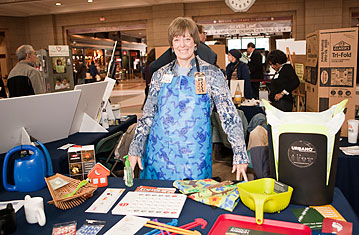
At the end of the day, volunteers and usability professionals gathered in the MIT Stata Center from 4:00 p.m. to 7:00 p.m. for networking and refreshments.
Learn more about World Usability Day 2009:
- View photos of World Usability Day 2009 in Boston
- Visit the World Usability Day 2009 in Boston web site.
- Visit the Global World Usability Day web site.
Find out about Boston-IA participation in previous years:
World Usability Day photographs, © 2009 Jacqueline Stetson. All rights reserved.
Peter Wallack of Oracle, "The Accidental Accessibility Program Director" (September 23, 2009)
![]()
On Wednesday, September 23, 2009, Peter Wallack, Accessibility Program Director in the Corporate Architecture Group at Oracle Corporation, shared personal reflections about accessibility issues and harmonizing accessibility standards in an enterprise organization. His talk was entitled, "The Accidental Accessibility Program Director".
The meeting was held at the Oracle offices at New England Executive Park in Burlington, Massachusetts.
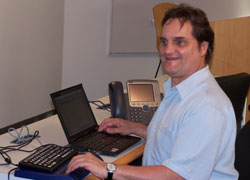
Over the last few years, there has been a dramatic increase in focus on accessibility world wide, due to new revisions of standards and laws, changes in technology, and lawsuits— among other things. This talk described the Oracle strategy to get all products (including acquisitions from such companies as PeopleSoft, Siebel, Hyperion, etc.) to meet one corporate-wide set of accessibility guidelines, and personal reflections on the lessons learned along the way.
Don Mauck (in the photo), Accessibility Evangelist at Oracle Corporation, attended the meeting with Peter Wallack. Don demonstrates the use of assistive technology for blind users as part of accessibility training for Oracle employees and customers.
Photograph, © 2009 Oracle Corporation. All rights reserved.
Peter's team defines the accessibility guidelines and standards for all Oracle products to follow, and he works with user interface designers, developers, documentation writers, consultants— and the sales, education, and support organizations— to incorporate those standards into their processes.
Peter Wallack has been with Oracle since 1989, picking up accessibility responsibilities in the Applications Division starting in 2000 (when Section 508 was being written), and taking over the role for the entire Oracle Corporation in 2007. Peter spoke about his experiences and lessons learned over the last two and a half years as Accessibility Program Director.
Peter is a member of the U.S. Technical Advisory Group to the JTC-1 Special Working Group on Accessibility for the International Organization for Standardization (ISO) and the International Electrotechnical Commission (IEC). He recently contributed a chapter on accessibility in the book, Web Form Design, by Luke Wroblewski.
Download Peter's September 23 presentation in PDF format, access the text-only version of Peter's presentation, or visit the Oracle Accessibility Program web site:
- Slides from Peter Wallack's presentation.
(33 slides, PowerPoint Presentation, 1109 KB) - Text-only version of Peter Wallack's presentation
(includes speaker notes). - Learn about the Oracle Accessibility Program.
Panel of Speakers on "Ten-Minute Accessibility Talks" (April 30, 2009)
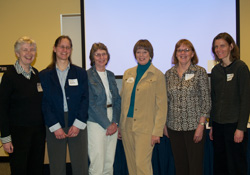
On Thursday, April 30, 2009, Boston-IA presented an evening of ten-minute talks on a variety of accessibility topics by a panel of speakers made up of members and friends of Boston-IA. After each ten-minute talk, members of the audience had an opportunity to ask questions.
We borrowed the idea from our sister organization, the Usability Professionals Association. The audience loved the format, so we will definitely do it again.
Boston-IA Speakers (in the photo, from left to right): Charmian Proskauer, Heather Hedden, Mary Utt, P.J. Gardner, Barbara Casaly, and Kim Patch.
Speaker photograph, © 2009 Vittorio Bucchieri. All rights reserved.
The six speakers presented talks on the following topics related to the accessibility and universality of electronic information:
- Mary Utt: "VPATs 101: Documenting Product Accessibility"
- Kim Patch: "Speech Input and Web Accessibility"
- Barbara Casaly: "Using Word to Create Accessible PDFs"
- P.J. Gardner: "Working with Visual Designers for Universal Access"
- Heather Hedden: "Web Site A-Z Indexes"
- Charmian Proskauer: "Making a Site Built with a CMS Accessible"
The meeting was held at Bentley University in Waltham, Massachusetts, and co-sponsored by the Design and Usability Center (DUC) and the Information Design and Corporate Communication (IDCC) department at Bentley University.

Lorraine Norwich of Boston University on Invisible Disabilities (April 1, 2009)
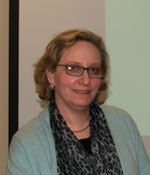
On Wednesday, April 1, 2009, Boston-IA presented Lorraine Norwich, Assistant Director of Disability Services at Boston University, speaking about design and accommodations for the many disabilities that may not be immediately evident. Her talk was entitled, "Invisible Disabilities: Designing with Awareness".
Almost 81% of people with disabilities have an invisible disability, with impairments such as learning disabilities, mental health issues, diabetes, epilepsy, or neurological disabilities. Are we designing websites and technology for these types of disabilities? What do we need to do to design for this population?
The meeting was held at the Boston University Office of Disabilities at 19 Deerfield Street in Boston (near Kenmore Square).
After the talk, members and guests engaged in a lively discussion generated by the topic.
Photograph of Lorraine Norwich, © 2009 P.J. Gardner. All rights reserved.
Andrew Kirkpatrick of Adobe Systems: "Accessible PDF Documents and Forms" (March 3, 2009)
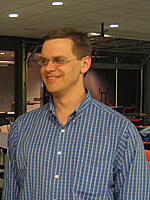
On Tuesday, March 3, 2009, Boston-IA held a joint meeting with the Technical Editing Special Interest Group (SIG) of the Society for Technical Communication (STC) presenting Andrew Kirkpatrick of Adobe Systems Incorporated. Andrew's informative talk was entitled, "Accessible PDF Documents and Forms".
PDF (Portable Document Format) documents and interactive forms allow content authors to present material exactly as intended, and they have the advantage of being platform independent. PDF files are easy to build from many applications, but a few more steps are needed so that PDF documents can be made as accessible as possible for the widest range of people— regardless of ability or disability— using the free Adobe Reader®.
The session provided tips for the beginner who needs to understand the basics of creating and repairing PDF documents, and described best practices and tools available for professionals who need to deliver accessible forms and complex documents regularly.
Andrew Kirkpatrick is Senior Product Manager for Accessibility at Adobe Systems Incorporated. Andrew's team attends to accessibility issues with product teams across the Adobe product line and works with customers and standards groups, including participation on Section 508 and W3C accessibility committees.
The meeting was held at Middlesex Community College in Bedford, Massachusetts.
Photograph of Andrew Kirkpatrick, © 2007 Mark Doerschlag. All rights reserved.
Boston Interactions Holiday Party (January 14, 2009)
Boston-IA and the other Boston Interactions community groups enjoyed a great holiday party at Boston Beer Works (a pub restaurant near Fenway Park and Kenmore Square) on Wednesday, January 14, 2009.
The Usability and Interaction groups of Boston, in association with their sponsors, enjoyed the second annual cross-group event, bringing together members of all the premier Boston-area Interaction organizations for one big night of food and fun.
Approximately 200 people attended the party to network and socialize with members and friends of Boston's user experience and user interaction organizations. Generous amounts of appetizers and hors d'oeuvres were provided, and many people took advantage of free tours of the on-site brewery. A slide show ran continually, presenting information about the participating organizations and scenes from the first annual Boston Interactions party (in 2008 at The Asgard Pub in Cambridge, Massachusetts).
The sponsors for the January 14 party included:



